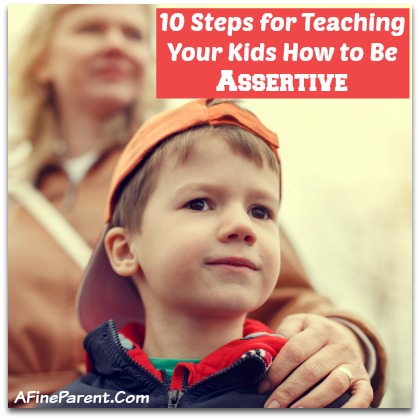 Are you struggling with a child who has difficulty standing up for himself?
Are you struggling with a child who has difficulty standing up for himself?
Maybe you’re worrying about your own level of assertiveness and how to model strong behavior?
I am the child of a mother who blurred the lines between where she ended and where I began. I grew up with very little understanding of personal and emotional boundaries.
I was expected to agree with my mother’s opinions without question. If I didn’t, there were consequences, usually in the form of yelling or loss of a privilege as punishment for my “disrespect.”
I rarely spoke up for myself or shared my personal feelings because I was afraid of what might happen if I did.
As an adult, I am still hesitant to assert myself with my friends, family, coworkers, or even casual acquaintances.
I have struggled with a lifetime of silence in which I hesitate to speak my mind for fear of negative consequences or withdrawal of love by people close to me. I struggle with feeling responsible for the feelings of others and avoid saying or doing something that I think might upset someone else.
I have been told that these were positive traits because I am “sensitive to others” and “have a good heart.” But I have paid a steep price for my silence in the forms of low confidence, low self-esteem, and severe passivity.
Now that I am a mother, I’m trying to learn how to assert myself and set appropriate boundaries in my relationships. My ultimate goal is to teach my daughter what I learn about assertiveness so she can live a less anxiety-ridden life.
I have discovered that there are many like me who were raised “to be seen and not heard” and who want to stop the cycle of passivity and raise children who advocate for themselves.
Over time, I have learned that there are 10 key steps to helping children learn to be assertive. Do I always implement them with flawless precision? I’m afraid not.
But I’m doing my best to unlearn the behaviors I acquired in childhood and raise an assertive child who possesses unwavering self-respect. That’s the best we can do right?
OK, here we go –
#1. Talk About Boundaries
 The concept of boundaries is central to the concept of assertiveness. We should talk to our kids about appropriate personal boundaries in all of its forms: physical boundaries, emotional boundaries, legal boundaries, school and workplace boundaries, etc.
The concept of boundaries is central to the concept of assertiveness. We should talk to our kids about appropriate personal boundaries in all of its forms: physical boundaries, emotional boundaries, legal boundaries, school and workplace boundaries, etc.
Teaching boundaries involves teaching children about respect for themselves and respect for others.
A simple way I have found to explain the concept of boundaries is to first point out concrete physical boundaries that they can see such as fences or stop lights. These boundaries are put in place to protect our safety and privacy. A violation of these boundaries often leads to dire consequences such as accidents, a ticket or even arrest.
From there, we can move on to talk with our kids about personal boundaries like physical space. We should explain to our kids that they have a right to body autonomy and should always speak up if these rights have been violated.
Too many children, me included, are raised to believe they are obligated to do what an adult tells them to do. This combined with an unclear understanding of physical boundaries can not only put a child in a dangerous situation but can also lead to relationship issues when they are adults.
This is why I always respect my daughter’s “no” if she doesn’t want to give me a hug or kiss. Even at two years old, her physical space is hers and hers alone.
Emotional boundaries are another aspect of personal boundaries. If a child’s friend is calling him names or making fun of him, the child is within his rights to speak up about how it makes him uncomfortable.
If the friend keeps doing it, the child has the right to stop being friends with that person.
The same concept applies to parent-child relationship as well. Just as we parents don’t enjoy it when our kids are disrespectful to us, we should teach them that they are within their rights to expect respect from us. And we need to make every effort possible to live up to that expectation.
Children who are taught appropriate boundaries and assertiveness often grow up to be successful adults who speak up for the things they need and want.
#2 Explain Why Assertiveness is Important
I’ve seen a lot of people, my family included, mistake assertiveness for rudeness. These same people often have poor boundaries and don’t understand the difference between being direct and being mean.
The truth is, assertiveness is a necessary part of establishing safety and trust in relationships. If a child grows up afraid to speak up for himself, he might passively allow resentment to build in his future relationships.
It might be difficult for a child to understand the extent to which this concept reaches, but he can understand that being assertive will make his relationships better.
For example, imagine you ask your child what he wants for a snack. He says applesauce, but you thought you heard him say apple slices. When you give him the apple slices, your child has a choice. He can eat the apple slices and silently regret not having applesauce, possibly becoming angry at you for “ignoring” him. Or he can speak up and say, “I think you might have misheard me, Mom. I would really prefer applesauce.”
Depending on your child’s age, he may not be able to approach the situation with that level of maturity. The important thing is that he speaks up and tells you the truth about what he really wants. With your guidance, your child can learn how to speak up while still showing respect.
#3 Respect and Praise Your Child’s Assertions
 It is important that your child’s words be respected. This does NOT mean always giving him his way. What it means is that you acknowledge his feelings and let him know that you are listening.
It is important that your child’s words be respected. This does NOT mean always giving him his way. What it means is that you acknowledge his feelings and let him know that you are listening.
My two-year-old daughter once had an absolute emotional meltdown because I wouldn’t allow her to eat fruit snacks before dinner. Instead of scolding her for being angry, I simply acknowledged her feelings while holding firm to my boundary:
“I know you are hungry. We are going to eat very soon.”
An older child might want to talk or argue. Fortunately for me, this was enough to diffuse the situation and distract her with a fun activity until dinner was ready.
The most important thing is that I respected her feelings. It would have been very easy to roll my eyes, call the tantrum ridiculous, and place her in time out. It may have been ridiculous to me, but to her it was very important.
Little things, big difference.
Similarly, it is crucial that we respect when our children set a boundary. My daughter frequently tells me “No” if I ask for a hug or a kiss. When I was a child, I would have been forced into giving the hug or kiss anyway and threatened with punishment if I refused.
I could have easily made her feel guilty with a statement like, “It makes Mommy sad when you won’t give her a kiss” complete with fake pouting.
But it is important to me that my daughter understands that she has the right to say no to physical contact. If she turns down a hug or kiss, I respond with a simple, “Okay,” and move on to our next activity.
This leaves her free to decide when she wants to express affection and teaches her that her words and feelings matter. Her parents and other family members should be the first to teach and respect her right to body autonomy.
When you respect your child’s assertions, you should also reinforce those assertions by giving positive praise. Tell him that you are happy that he spoke his mind, even if he disagreed with you. Tell him you are proud of him for standing up to a bully. Whenever you see your child positively asserting himself, be sure to reinforce it with praise.
#4 Respect Your Child’s Privacy
When parents or other family members don’t respect a child’s privacy, it can leave them feeling unsafe and violated. If your child tries to assert himself and protect his space, listen and respect it.
I frequently caught my mother reading my diary when she was “cleaning my room.” It was an almost daily occurrence for my sister or mother to barge in on me while I was on the toilet or in the shower. It even increased in frequency when I reached adolescence as if I were being constantly reminded that my space was not my own.
My protests were met with statements such as, “Relax. You don’t have anything I haven’t seen before,” or “It’s my bathroom. I can do what I want.”
If I had friends over, she eavesdropped on my conversations with them and then had “discussions” with me about the things she overheard.
I became extremely secretive as a teenager. I didn’t dare talk about my crushes with my friends when I was at home or write about worries and fears in my diary unless I was sure I could keep it hidden. I eventually developed a “double life” where I lived one thing and told my parents another.
Respecting you child’s right to privacy not only teaches him that you respect his boundaries and how to assertively draw a line around his own personal space, but it also leaves your child feeling more comfortable about sharing things with you. Respect for your child’s privacy can only strengthen your relationship in the long run, making it easier for him to come to you if/when he really needs your help.
#5 Encourage Your Child to Express Feelings
 Children need to feel safe and comfortable being themselves in every situation. This type of confidence and assertiveness begins at a young age. When children begin to express their emotions, especially as toddlers, parents shouldn’t stifle them or punish them for negative expression.
Children need to feel safe and comfortable being themselves in every situation. This type of confidence and assertiveness begins at a young age. When children begin to express their emotions, especially as toddlers, parents shouldn’t stifle them or punish them for negative expression.
I remember not being permitted to express anger as a child. If I threw a tantrum, I was swiftly punished. If I disagreed with my parents, I was scolded or punished. If I cried too long after getting a spanking, I was scolded for crying.
It is now reflexive for me to repress my emotions and avoid crying, disagreeing, or telling someone when I am angry. It’s a hard habit to break. Failure to speak up in the moment has had long-term negative effects on my life.
The truth is that when children are free to express both positive and negative emotions in a safe space, they learn how to manage their emotions and assert themselves in various situations.
Children should be taught from a young age that their feelings are important and valued – irrespective of whether they are positive or negative feelings. They need a safe space to be angry or sad without fear of negative repercussions.
#6 Encourage Extracurricular Activities
Team building exercises are an excellent way for children to build confidence and exercise assertiveness. It can sometimes be a lot more intimidating to stand up to peers than to authority figures. Activities that involve teamwork can help with that.
When your child learns to work with a team, he not only learns cooperation and compromise, but he learns how to speak his mind to get the job done right. This is why sports or involvement in organizations such as boy scouts or girl scouts or other clubs is often strongly encouraged among children.
The children learn the difference between aggressiveness and assertiveness and work together toward a common goal and learn to assert themselves among their peers to accomplish it.
#7 Model Assertiveness
There is no better way to teach your child to be assertive than to show him how to do it. Be aware of how you interact with family and friends. If you have to make a call to a customer service line or return something to a store, maintain a polite but direct tone.
If you tell someone “No,” stick to your word. Make sure your child sees you modeling what you are teaching by holding your ground, especially with people who have attempted to violate your boundaries.
You can begin with a discussion, but the best way to teach boundaries and assertiveness is to make them a regular part of daily life. We should model self-respect and take the appropriate steps to apologize and make amends when we make a mistake or violate someone else’s boundaries.
#8 Put Your Child in Charge of Decisions
 There is opportunity every day to let a child make his own decisions.
There is opportunity every day to let a child make his own decisions.
Naturally, there are times where you will need to set limits (“No, you can’t have Fruit Rollups for dinner”). But making choices is a part of learning to be assertive.
Give your young toddler clothing options. (Limit it to two or three or you will be there all day. TRUST ME.) Or let your preschool or grade school child choose what he wants to eat at a restaurant and even place his own order. A high schooler can take on even more responsibility by choosing the college he wants to attend, how he will pay for it, and so on.
In a similar vein, allow your child to make his own mistakes. If he makes mistakes, he will ultimately learn from them and increase his ability to assert himself in the long run.
In many families with unclear boundaries, there is an insistence on keeping children from making their own mistakes. There is criticism when the child messes up and doesn’t live up to parental expectations. There is sometimes labeling of a “good kid” versus a “bad kid.”
When parents place their own self-worth on their child and see their child’s success and failure as their own, they have a negative impact on their child’s self-esteem and model poor boundaries.
This, in turn, prevents the child from exercising assertiveness – the cost of failure from standing up for their choice is too high. It seems easier to just keep his mouth shut and suffer in silence.
It is very important to determine where you end, and your child begins.
#9 Teach Your Child to Manage Emotions and Handle Disappointment
A large part of teaching assertiveness is to teach your child how to manage his emotions when asserting himself. Lashing out in anger and yelling at someone is an example of an inappropriate emotional expression.
While we teach our kids to be assertive, it is equally important that we teach them how to communicate their anger, sadness, and needs in a respectful manner that will not leave the other person feeling afraid or disrespected.
For example, instead of yelling at his sibling in anger when his privacy has been violated, teach your child that a good way to be assertive is to say, “I am angry that you went into my room without my permission. Please stop doing that.”
#10 Teach Your Child to Follow Through
 Perhaps the most important part of teaching children to be assertive is teaching them to follow through with what they say. If your child has told his sibling that he doesn’t want him going into his room and taking his toys but then says nothing if it happens again, he is not following through on his words.
Perhaps the most important part of teaching children to be assertive is teaching them to follow through with what they say. If your child has told his sibling that he doesn’t want him going into his room and taking his toys but then says nothing if it happens again, he is not following through on his words.
I am guilty of this one more often than I care to admit. I have made requests or set boundaries that have fallen on deaf ears. Too often, I have allowed those boundaries to be violated without speaking up.
Speaking up once and then allowing it to happen later only shows people that we don’t mean what we say. It is important that we model this by sticking to our word. If you tell your child that he cannot have a cookie before dinner but give him one when he cries, you are teaching him that your word means very little in light of his emotional reaction.
Following through with what we have said in spite of the presenting emotional reaction of someone else models for our children that we are people of our word. It is not only about disciplining our children. It is about exercising self-discipline in the face of stressful circumstances.
This will help prepare children for times when someone else is upset at their directness. This is a skill that will benefit them in both their future professional and personal lives. If a coworker asks them to complete a project for them when they are already swamped with their own work, they will have the confidence to say “No” even if the coworker becomes angry.
If a family member insists that they attend an event when they are too busy to do so, they will feel comfortable declining the invitation even if the family member expresses disappointment.
Teaching children assertiveness allows them to be considerate of others while still looking out for their own needs.
They will be able to speak up for themselves and others with confidence and without fear of what others may think or say. Teaching children that they are not responsible for managing the emotions for others and are only responsible for managing their own will allow them to lead lives of emotional freedom and confidence.
And it all adds up to a simple, uncomplicated, happier life with less stress and anxiety. At the end of the day, isn’t that what we all want for our kids?
The 2-Minute Action Plan for Fine Parents
- With older kids, present scenarios in which he might be required to be assertive. Guide him through what to say to be direct without being rude.
- When you watch something in the news or hear someone talking about real world scenarios (ex: school bullying, social media debacles, etc.), make some time to discuss it with your kids and try to figure out what might be the best ways to handle such situations.
- If you struggle with assertiveness yourself, practice being assertive and saying “No” in the mirror until you are comfortable seeing and hearing yourself say it. Then start small. If someone asks for a visit, and you are unprepared for company, go ahead and say “No.” And let your child see you do it.
The Ongoing Action Plan for Fine Parents
Remain aware of your interactions with your child throughout the following days and weeks. Hear what your child is saying and manage your reactions accordingly.
Are you respecting your child’s physical and emotional space? Are you listening to him? At the end of each day, write down how you respected your child’s boundaries and modeled assertiveness. Then write down ways you can improve. Have a talk with your child about boundaries and assertiveness and answer any questions he may have.
Take time each day to practice assertiveness in your own life. If you are angry, speak up and say so in a firm and direct, albeit respectful, manner. If you are unable to attend an event, don’t make excuses. Be honest about why you can’t be there (even if the reason is that you simply don’t want to go).
When your child sees you practicing these things in your own life, he will be encouraged to follow your lead.
Great article! Timely I found this in 2022. I will definitely practice this. we were raised differently. In Africa, a child is seen not heard, it affected me a great deal. I will do better with my children and share with other parents.
Letting your child know you are fallable too is really important. Growing up assuming adults always get it right and never lie isn’t healthy. How can your child aspire to that?
Every so often I’ll talk to my kids about how something didn’t go as I expected and maybe I should have done something differently.
It’s a balance. I don’t want to expose them to all the pressures of my life, but I want them to see me dealing with situations that arise day to day.
The article is great and really resonates with my experience growing up. Thanks for sharing!
I’m not an expert by any means – just a parent doing her best. But now that my daughter is older since I first wrote this piece, I can say that honesty with my child has produced the best results.
I would personally apologize to him for making him apologize for something he didn’t do. He needs to know that you have his back. When children feel secure with their parents, they are more likely to be assertive and speak up for themselves. Your relationship with him is priority over any thing else.
My child was wrongly accused by another parent for hurting her child when it was actually her little brother (there were witnesses). Instead of being assertive about the fact that he didn’t do it and it honestly wasn’t him, I made him call my friend and apologize, for the ‘sake of the friendship’. This has left me feeling angry- it ruined the friendship anyway- and I want to teach my son to always stand up for honesty and not to cave in for the sake of a relationship etc. I really believe this is wrong. I am resentful and he was angry and disappointed in me for making him take the blame. What can I do to rectify the situation? Thank you, Natalie
I’m not an expert by any means – just a parent doing her best. But now that my daughter is older since I first wrote this piece, I can say that honesty with my child has produced the best results.
I would personally apologize to him for making him apologize for something he didn’t do. He needs to know that you have his back. When children feel secure with their parents, they are more likely to be assertive and speak up for themselves. Your relationship with him is priority over any thing else.
Love these tips! I’m a shy and quiet person who prefers keeping my feelings and thoughts to myself. I grew up as an introvert and I don’t want my daughter to grow up like me. I will definitely keep this in mind so when she’s old enough to understand things, I will start teaching her how to be assertive.
This is a great article. It’s easy for me to say no to sweets before dinner etc. Do you have any suggestions for getting my three year old TO do something? For example, she doesn’t want to brush her teeth. I ask nicely, then say, okay, I need you to do this. She says no…then what? I mean, beyond picking her up, taking her to the bathroom, and wiggling the toothbrush through the corner of her lips (which results in crying and an open mouth), I can’t figure out a way to get it done. I don’t want to physically enforce it, but I talk to her about it, but having a discussion, making deals etc gets old. I’m a single mom and I have to get out of the house for work. So how do I be assertive while also respecting her boundaries?
I had the same problem with my 3-year-old! I eventually started asking her if she wanted to do things the “easy way” (willingly, with praise) or the “hard way” (where I force the toothbrush in her mouth). She often chose the hard way because she thought it was funny but at least she was laughing instead of screaming. She is more reasonable now she’s older and I only say it occasionally now.
Wow!! I love to learn & gain insight from others. That wasn’t the case years ago. A lot has changed within my thoughts & the way I perceive things.
As a child growing up I dealt with the same thing as yourself & it has affected me without question. Knowing what I know NOW (lots of reading, therapy, 12 step groups, etc.) has meaning & depth to it. I will say this…. I must admit that while growing up my parents fully supported me with housing, clothing & food. Many aspects of my childhood are thought of as wonderful & caring just to mention a few. However, there is more to parenting than the basic necessities which they did more than enough in that area.
Lastly, I’m in the midst of dealing with my parents about this as we speak. For the past many months I have gone back & forth deciding & undeciding of what & what not to say on this topic as well as others. SOOO frustrating to say the least. On a positive note, after reading this it has helped me make a FINAL decision on what to do & within the next week we shall see the outcome of what takes place. I feel a sense of empowerment, am mentally stronger, & has added emotional resiliency to my well being.
Thank you for such an informing & powerful story of your past as well as your present.
Daniel… ?
Great article this is so common and im glad I read this at the right time I want my kids to learn to say NO with respect and people around them including me to understand that its OK.
I agree. It is so important that children be allowed to say “no.”
I had real problems with being assertive, and, so I read a number of books that offered guidance to those that shared my problem. I wanted to practice being assertive, but I read that I should practice more when I am with strangers. In that way, I would be less apt to hurt the feelings of a loved one. Later, I would understand how to talk to a loved one in an assertive manner.
I like the idea of practicing assertiveness with strangers first. It is very hard to break those ingrained habits, and it is best to start small at first. It also demonstrates for your children that you don’t have to be perfect. It is the effort that is important.